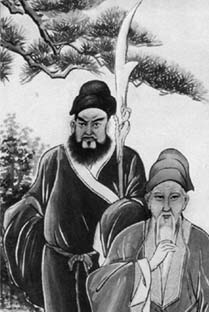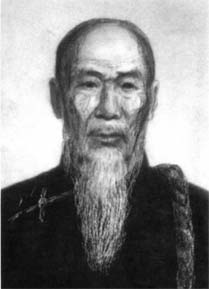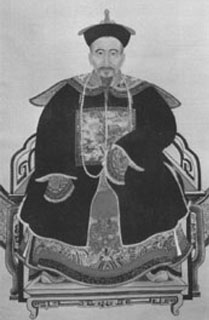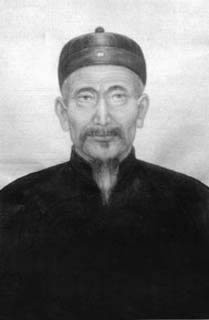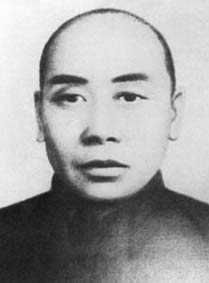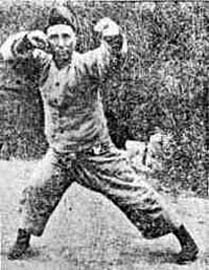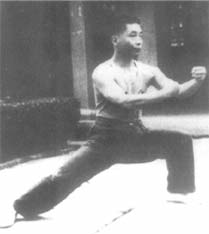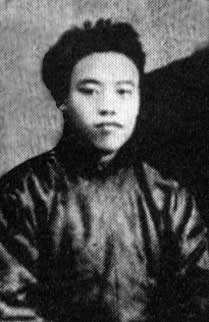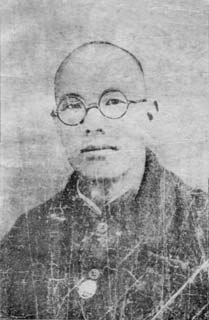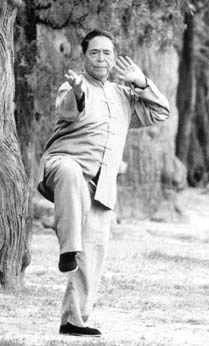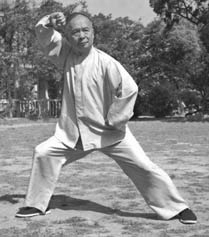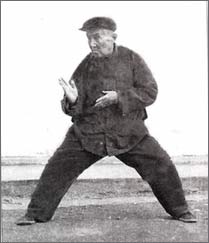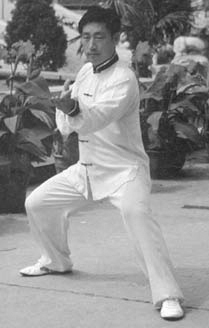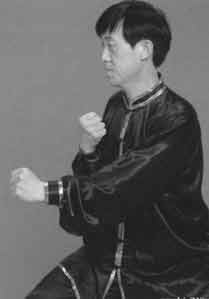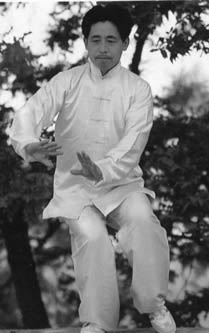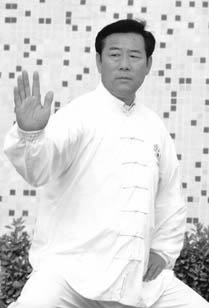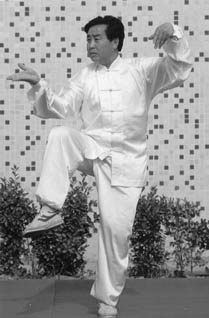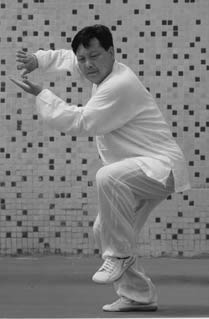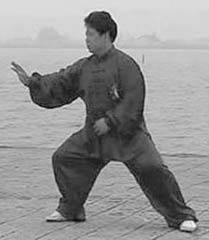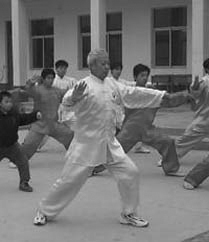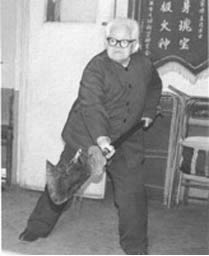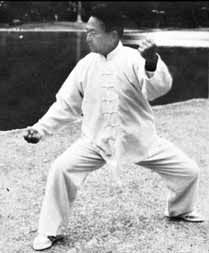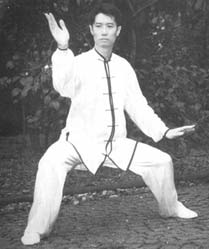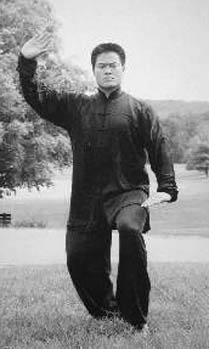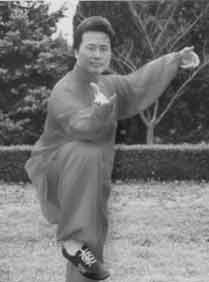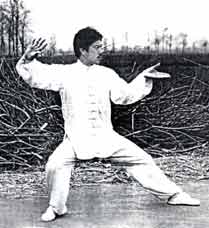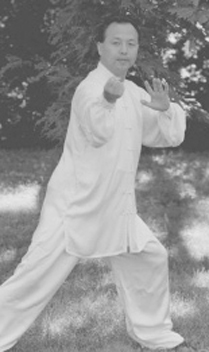Chen Wang Ting (1600-1680),
-also known as Chen Zouting- of the 9th generation from the founding
ancestor Chen Bu, is traditionally held to be the originator of the
Chen style of Taiji.
It is said that he was a sucessful candidate in the imperial military
examinations at the provincial level in the late Ming dynasty. In
1644 ( the 14th year of Chongzhen in the reign of emperor Sizong-
also the final year of the Ming dynasty, in which the combined influences
of Manchu military expeditions from the north and rebel insurgences
in central China served to topple the dynasty)
He was appointed Commander of the Garrison Force of Wenxian county.
He engaged in military expeditions against rebel forces commanded
by Li Zicheng in Shandong. Upon the fall of the Ming, his opportunities
for advancement ruined by the change of dynasties, he retired to Chenjiagou.
It is said that while in retirement, he fused techniques from the
teachings of the Ming general Qi JiKuang with traditional medical
theory and taoist breathing techniques to form a unique yielding form
of martial art.
Chen Soule 10th generation
Chen Guangyin 11th generation
Chen Zhengru 11th generation
Chen Shanzhi 12th generation
Chen Jingjie 12th generation
Chen Jingxia 12th generation
Chen Jingbai 12th generation
"In the Jia qing reign (1796-1821) of the qing dynasty, my ancestor
Chen Jingbai, whose martial arts skill was of the highest level, travelled
as an armed escort in Shandong province for a number of years. His
reputation was such that robbers upon hearing that he was guarding
the transport would not dare to attack. in Qing zhoufu he defeated
Wang Ding Guo, a famous monk of the Shaolin sect. Chen Jingbai was
widely praised and admired."
-Chen Zhao Pei
Chen Binwang (1748-?) 13th generation
Student of Chen Jingxia, and teacher of Chen Chang
Xin.
Chen Binren 13th generation Student of Chen
Jingxia,
Chen Binqi 13th generation Student of Chen
Jingxia
Chen Gongzhao 13th generation Student of
Chen Jingxia. The tale is passed down that, at the
age of eighty, he used his skill to sudue a rampaging bull at a village
festival.
Chen Yaozhao (Youguang) 13th generation Student
of Chen Jingxia
Chen Changxin (1771-1853) 14th generation
Son and student of Chen Binwang. Known as "King of (Ancestral)Tablets"
for his upright posture and reverent attitude, he is best remembered
as the instructor of Yang Lu Chan, the founder of the Yang school
of Taijiquan. The author of three manuscripts on the art, he has been
traditionally credited with synthesizing the empty hand routines attributed
to Chen Wang Ting into two forms: Yi Lu and Er Lu (Pao
Chui, or Cannon Fist). These routines, along with the weapons
sets came to be known as "Big Frame" or Lao
Jia (Old Frame). He was employed as a bodyguard.
Chen Youheng 14th generation. Son of Chen
Gongzhao.
Chen Youben 14th generation. Son of Chen
Gongzhao. He is credited with the creation of the Xin Jia,
or "new" frame form (so named to differentiate it from the "old" frame
of Chen Chang Xin). It is now known in Chenjiagou as Xiao Jia
(small frame).
Chen Youxu 14th generation
Chen Gengyun 15th generation
The son of Chen Changxin, he served as a convoy guard (piao-shih)
for the gentry in Shandong, following in his father's profession.
His prowess was well known: a monument to him was erected in Shandong
attaining to his proficiency as a guard.
Yang Luchan 15th generation
Noted as the first non Chen family member to master the art. He was
the student of Chen Changxin, and later founded the Yang school of
Taijiquan, based on the Chen style. He achieved great fame in Beijing
as a fighter and teacher.
Chen Huamei 15th generation. A student of
Chen Changxing.
Chen Qing Ping (1795-1868) 15th generation
Son of Chen Youben. He is credited with originating the Zhaobao
style of Taijiquan, ( having married into the Wu family of Zhaobao,
and relocating there) based on the Xiao Jia frame.
Chen Gongyun 15th generation
Chen Boshen 15th generation. The son of
Chen Youheng.
Chen Jishen (1809-1865) 15th generation. The
son of Chen Youheng. A sucessful candidate for the imperial
military examinations. He fought the Taiping rebels along
with his brother Zhongsheng.
Chen Zhongsheng (Zhixun) (1809-1871) 15th generation
Chen Zhongsheng was the son of Chen Youheng. It is said that he was
the founder of the Xin (now known as Xiao) Jia style. He
was taught martial arts by his grandfather, Chen Kung Chao, and said
to be generous, public spirited, noble, and chivalrous. A sucessful
candidate for the imperial military examinations, he is noted for
leading a local force from Chenjiagou ( along with Chen Gengyun and
Chen Jishen) against Taiping rebels during the reign of the emperor
Hsien-feng, achieving an overwhelming victory. He was known as "The
Righteous Hero". Chen Zhongsheng is also noted as the father
of the author and Master Chen Xin.
Chen Youlun 15th generation
Chen Hengshan 15th generation
Chen Miao 16th generation.
The son of chen Jishen. One of the greatest practitioners of
his generation. He fought extensively against the Taiping rebels,
and was killed in battle with them.
Chen Miao 16th generation.
The son of Chen Jishen. One of the greatest practitioners of
his generation. He fought extensively against the Taiping rebels,
and was killed in battle with them.
Chen Wudian 16th generation. son of Chen
Huamei
Chen Wuchang 16th generation. son of Chen
Huamei
Chen Yao 16th generation. Son of Chen Zhongshan.
a sucessful candidate for the imperial military examinations, he began
a career as a soldier in 1853, fighting in campaigns for more than
10 years. He was undefeated.
Chen Yan 16th generation. Son of Chen Zhongshan.
Chen Yanxi 16th generation
The son of Chen Gengyun, he was noted as the instructor of the household
of Yuan Shi Kai: "famous martial arts experts who met him in contests
were invariably defeated. From Shandong he went on to Tianjin, teaching
continuously for six years. Then, because his mother was getting old,
he took his leave and returned home, practicing medicine for the rest
of his days"
-Chen Zhao Pei
He is also remembered as the instructor of Du Yu Tse.
Chen Yannian 16th generation
The son of Chen Gengyun
Chen Xin (Chen Qi, Chen Pinsan) (1849-1929) 16th
generation
The son of Chen Zhongsheng. He was chosen by his father to pursue
literary accomplishments, and was employed as a schoolteacher. While
an accomplished practitioner of Taijiquan, he is remembered for his
writings on the art: Chen shih taijiquan t'u shou, Chen shih chia-cheng,
An-yu-hsien shih wen chi, Taijiquan yin-meng ju-men and San-san liu
quan pu.
Chen Fake (1887-1957) 17th generation
The son of Chen Yanxi, and the great grandson of Chen Changxin. Perhaps
his greatest contribution to martial arts was his creation of the
"xin jia" branch of Chen family Taiji, which he taught from
1940 to his death in 1957. He cofounded the Capital Wushu Association
of Shanxi with Hu Yaozhen (Xingyi instructor of Feng Zhiqiang). Chen
Fake taught a number of students, among them his second son, Chen
ZhaoXu, his third son Chen Zhaokui, Chen Zhaopei, Feng Zhiqiang, Gu
Liuxin, Liu Ruizhan, Tang Hao, Li Jinwu, Li Mumin, Hong JunSheng,
and Tian Xiuchen. See "Tales
of the Masters" for more information.
Chen Deng Ke 17th generation. He taught
in the Shanxi-Gansu region.
Chen Zhuangyuan (1877-1949) 17th generation.
He taught in Hunan. and was instrumental in the preservation
and publishing of a book by his uncle, Chen Qi.
Chen Deyu 17th generation.
Chen Baoju 17th generation.
A student of Chen Yannien, Chen Yanxi, and Chen Fake, he taught
in Xian, Zhengzhou, Nanjing, and Jiangxi.
Chen Guo Ying 17th generation
Chen Shou Li 17th generation
A student of Chen Fake. He is noted by author Xie Jun Sheng as one
of the last known practitioners of the original 13 posture sets of
Chen Wang Ting. Xie notes meeting him in Xian in 1973, when Chen was
driving a pedicab, and over 80 years of age.
Chen Xingsan (1880-1942)17th generation. A
student of Chen Yanxi and Chen Qi.
Chen Songyuan 17th generation
Chen Chunyuan 17th generation
Chen Xingyuan 17th generation
Chen Zhiming 17th generation. Son of Chen
Fuyuan, he was a noted teacher and author.
Chen Lianke 17th generation
Chen Zhaokui (1928-1981) 18th generation
Chen Zhao Kui was a student and second son of his father, Chen Fake.
He began to learn from him when he was eight years old. While living
and studying in Beijing, he was noted as one of the first exponents
of the "xin jia" style created by his father. After 1960, he also
taught in Shanghai and Nanjing. He is credited for bringing the Xin
Jia style to Chenjiagou, returning from Bejing in 1973 at the
request of Wang Xian. He taught Xin Jia in both public and
private classes, passing knowledge of the art on to the "four warrior
attendants" Chen Xiaowang, Chen Zhenglei, Wang Xian, and Zhu Tiancai.
Other students include Ling Zhian, Cheng Jin Zhai, Ma Hong, and Wu
Xiou Bou. He was reknowned for his skill in Qinna (catch
and hold techniques).
Chen Zhaoxu (1909-1960) 18th generation
The second son of Chen Fake. Famed as a fighter, he may have assisted
Chen Fake in teaching in Beijing during Fake's "early period." He
was known for his skill in Lao Jia style. The father of Chen
Xiaowang.
Chen Zhaohai (1899-1950) 18th generation
A son of Chen Dengke. He fought in the Nationalist army under Fan
tinglan against the Japanese occupation. Often undertaking solo missions
against enemy camps, he was known as the "Lone Brave Hero"
Chen Zhaochi 18th generation
A son of Chen Lianke.
Chen Zhaopei (1893-1972) 18th generation.
Son of Chen Dengke, he is revered in Chenjiagou for the rennaisance
of the art in the 1960s and 70s. For more on Chen Zhaopei, see "Tales
of the Masters" and the memoir "My
Father, Chen Zhaopei"
Chen Hongen 18th generation
Chen Jinao (1899-1971) 18th generation. Son
of Chen Shangyuan. Remembered for his skill in Small Frame (xiao jia),
he aided in campaigns against bandits in Wen county in 1921. He taught
in Kaifeng, Wuhan, Baoji, and Xian.
Chen Honglie 18th generation
Chen Kezhong 18th generation. A student
of Chen Qi, he is noted for his teaching of "small frame"
Taiji.
Feng Zhiqiang(1926-) 18th generation
Feng Zhi Qiang was born in Shulu Xian, Hebei province. He originally
studied Tongbei Quan under Han Xiaofeng in Hebei, as well
as Liu He Xingyiquan from Hu Yaozhen of Shanxi. In 1951,
he began studying under Chen Fake in Beijing. He is noted for his
development of the Chen Shi Xin Yi Hun Yuan Taijiquan system.
Gu Liuxin (1908-1990)18th generation
A student of Chen Fake, and a noted author and historian.
Kan Guixiang (1940-)18th generation
A student of Chen Fake. The creator of the 36 posture simplified
routine, as well as the 56 posture international competition
routine. She has also written many books on the art.
Hong Junsheng (1907-1996) 18th generation
Master Hong studied with Chen Fake in Beijing from 1930 to 1944. Hong
taught his small-framed, application-oriented laojia in Jinan, Shandong
from 1956 to the early '90s. Famous for his tuishou skills, he produced
several champions. In 1989 he published a major theoretical and instructional
work "Chenshi Taijiquan Shiyong Quanfa."
Liu Ruizhan 18th generation
Tian Xiuchen (1916-1984)18th generation
Chen Baohao (1904-1953) 18th generation
Shen Jiazhen (1891-1972) 18th generation
Pan Yongzhou (Pan Wing Chou) 18th generation
Chen Xiao Wang (1946-)19th generation
He began training under his father, Chen Zhaoxu at age 8. He also
trained under Chen Zhaopei and Chen Zhaokuei, becoming known as one
of the four "Buddhas' Warrior Attendants", the four outstanding exponents
of the 19th generation in Chenjiagou. In 1980 he won first place in
the National Wushu Tournament, beginning a string of first place honors
on the national level. He is the creator of two simplified forms,
the 19 and 38 posture routines. He is the standard bearer for the
19th generation, presently residing in Australia.
Chen Zheng Lei (1949-) 19th generation
An indoor student of Chen Zhaopei and Chen Zhaokui. One of the four
"Buddhas' Warrior Attendants". He is the author of a three volume
comprehensive overview of the Lao Jia system of Chen Taijiquan,
as well as a library of multimedia works dealing with the Xinjia
and Laojia systems. He presently resides in Chenjiagou,
and was voted one of the 13 "grandmasters" of Taijiquan in China (Da
Shi) in 1996.
Chen Xiaoxing 19th generation
Currently teaching at the Chenjiagou school.
Wang Xian (1945-)19th generation
Born in Xian, he was a student of Chen Zhao pei and Chen Zhaokui.
The head of Chen village during the cultural revolution. One of the
four "Buddhas' Warrior Attendants" he was voted one of the 13 "grandmasters"
of Taijiquan in China (Da Shi) in 1996.
Zhu Tiancai (1945-) 19th generation
A student of Chen Zhaopei and Chen Zhao kui. One of the four "Buddhas'
Warrior Attendants" he was voted one of the 13 "grandmasters" of Taijiquan
in China (Da Shi) in 1996.
Chen Shi Tong (1947-)19th generation
A student of Chen Zhao Pei.
Chen Yu 19th generation
The son of Chen Zhao Kui.
Chen Quanzhong (1925-) 19th generation
Studied with Chen Shi Gong, Chen Guo Ying, Chen Sheng San, Chen Liang
Zhi, Chen Jing Ping, Chen Jin Ao and Chen Shuo Li.
Chen Qingzhou (1933-) 19th generation
A student of Chen Wufang and Chen Zhao PeiFather of Chen Youze and
Chen You Qin.
Chen Liqing (1919-)19th generation
Daughter of Chen Honglie. Noted for her skill in Xiao Jia,
currently based in Xian.
Chen Lixian 19th generation
Chen Boxian 19th generation
Ma Hong (1927-)19th generation
A student of Chen Zhaokui.
Zhang Xue Xin 19th generation
Began his study with Lee Rei Yuan in 1963, later studying with Ruei
Mong Ni, Chen Zhaokui, and Feng Zhiqiang.
Chen Peishan 19th generation. Currently
teaching in Japan.
Wang Haijun 20th generation
A student of Chen Zhenglei. Currently teaching in England.
Ren Guangyi 20th generation
A student of Chen Xiao Wang. Currently teaching in New York.
Chen You Ze 20th generation
A student of Chen Qing Zhou. Currently teaching in China.
Chen You Qin 20th generation
A student of Chen Qing Zhou. Currently teaching in China.
Zhang Dong Wu 20th generation
A student of Chen Zhenglei. Currently teaching in China.
Yang Yang 20th generation
A student of Feng Zhiqiang. Currently teaching in the US.
|
